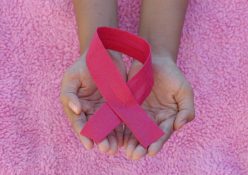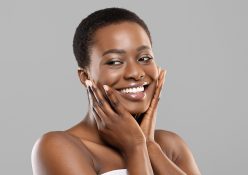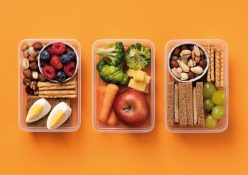Everything you should know about the dreaded disease this Breast Cancer Awareness Month
In 2020, there were 2.3 million women diagnosed with breast cancer globally. This makes it the world’s most prevalent cancer, especially in women after puberty but with increasing rates in later life. On average, 1.7 million women are newly diagnosed with breast cancer each year worldwide, with it also affecting women in South Africa the most – one out of 25 South African women are at risk of developing it, according to the 2017 National Cancer Registry (NCR). But the good news from the NCI (National Cancer Institute) is that 90.3% of women with breast cancer survive five years after diagnosis, regardless of the stage of diagnosis. While the five-year survival rate for women diagnosed with localised breast cancer is 99%.
Risk factors
The risk for breast cancer increases as women grow older but many women under the age of 40 are also prone to be diagnosed, as well as those with a family history of breast cancer. Being overweight, inactive, consuming alcohol, poor diet, smoking and exposure
to chemicals can also increase your risk. There is an increased risk if you have never given birth or your first confinement was after the age of 35 – pregnancy reduces a woman’s total number of lifetime menstrual cycles and it seems that this decreases your chance to be diagnosed with breast cancer.
Possible ways to reduce your risk
As you know your body best, it is crucial to do regular self-breast examinations. You need to look out for changes in your breasts or the underarm area, such as lumps, texture changes, thickening, dimpling, changes in shape or size of nipple or breasts, tenderness, discharge, rash or swelling, or that one of your breasts starts to be slightly larger than the other one. Research has indicated that regular breast self-examinations play an important role in discovering breast cancer early and should be done preferably once a month, at the same time of the day and usually following your menstrual cycle. Even if eight out of 10 lumps discovered in your breasts are not cancerous, it is still important to have this confirmed by a medical practitioner. A Clinical Breast Examination (CBE) by a health practitioner is a visual and manual examination of your entire breast, from your collarbone to the bra line, and from the armpit to the breast bone. This should form part of your annual medical check-up, as well as a yearly mammogram.
Preventative lifestyle changes can affect your overall health in the long term as well. According to the American Cancer Society, being overweight or obese can increase your risk for breast cancer, particularly after menopause. Thus try to maintain a healthy weight throughout your life by setting movement goals (even starting off with 30-minute light exercises daily and working it up from there) and practising good eating habits. Include a serving of vegetables with each meal and make sure to add fibre-rich legumes and wholegrains to your diet. Limit your intake of fatty red meats and processed meats – rather try lean proteins like chicken breasts and fish portions. Numerous studies indicated that excessive alcohol consumption of more than the two drinks recommended for women per day can contribute to an increased risk of breast cancer.
Even if breast cancer is not a diet-related cancer, what you consume also needs to change after diagnosis. Your daily diet needs to include as much raw, unprocessed, additive-free and chemical-free, growth hormone-free and organic food as possible. But even beforehand, this is a healthy option for you to follow. Check food labels for unpronounceable words or items starting with ‘E’ and followed by a number – it’s best to avoid these foods. Remember that eating nutritional food will make you feel better and also assist your immune system to help you get better. But remember that having radiation or chemotherapy may also affect your appetite and may even make
you nauseous – look out for foods to include to get in all your nutrients and which to avoid so that you don’t feel sicker.
Breast Cancer Survivors
Not everything is always working out for Hollywood actresses, because the morning after Julie Louis-Dreyfus (former Seinfeld star) won her sixth Emmy award for her TV show Veep, she received her biopsy result of breast cancer. Rounds of chemo while her show was on break left her with extreme nausea and diarrhoea. But a year later, after treatment, tests showed that her cancer was gone. Ultimately she used her experience and fame to help other women afford breast reconstruction. The stand-up comedian and actress Wanda Sykes usually sees humour in everything, but not when her health took a serious turn in 2011 after she had elective surgery to make her breasts smaller.
The samples of her breast tissue revealed that she had cancer in her milk ducts called ductal carcinoma in situ (DCIS), meaning that the cancer cells had not yet spread beyond the ducts. But because breast cancer runs in her mother’s family, she rather opted for surgery to remove both her breasts.Famous musicians such as Sheryl Crow and Kylie Minogue had no family background of cancer and led healthy lifestyles. Crow’s doctor recommended a biopsy to check her tissue samples, after her dense breast tissue made it hard for her to self-exam. But Minogue had to get a second opinion after her initial doctor missed her breast cancer diagnosis in 2005. She now tells women to trust their instincts concerning their bodies: ‘If you have any doubt, go back again.’
The granddaughter of Nelson Mandela and Winnie Madikizela-Mandela, Zoleka Mandela, was diagnosed with breast cancer at the age of 32 in 2012. After chemotherapy treatment, she is now in remission for the second time, as she continues to be an activist for breast cancer awareness and wants to be open about her experience with cancer so that she can help other women to deal with it. She also has two daughters conceived naturally and both birthed after her treatments – chemotherapy in 2012 and radiation in 2016.Other breast cancer survivors and activists are veteran actress Lillian Dube, who stated that her long battle with breast cancer gave her a new lease on life, and Isibaya actress Mbali Maphumulo. She believes that early detection saved her life, but she also opted for a double mastectomy during her survival battle of cancer as part of her treatment.
Words by Jandri Barnard
Photography: Courtesy Images







